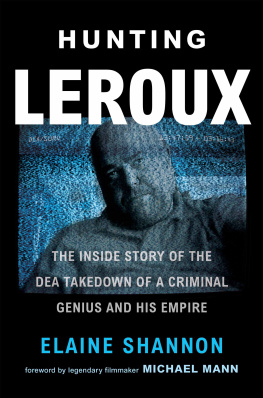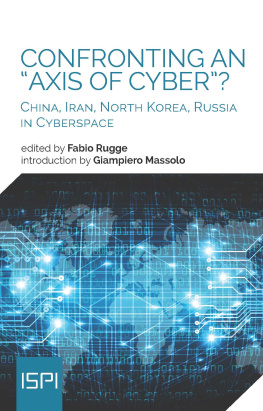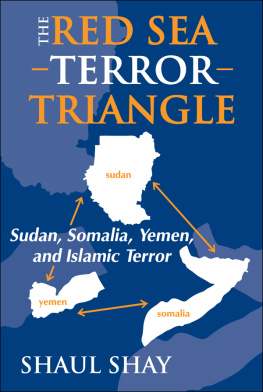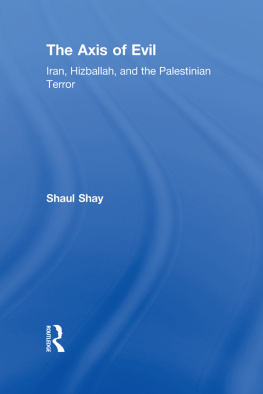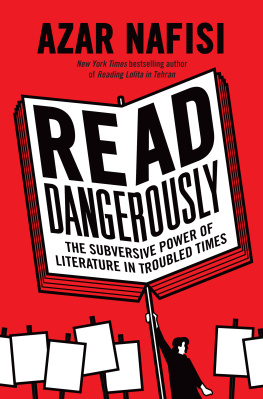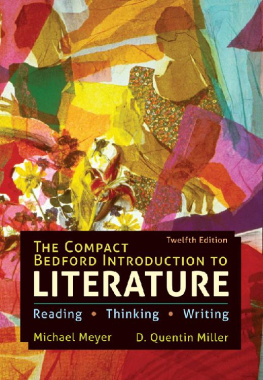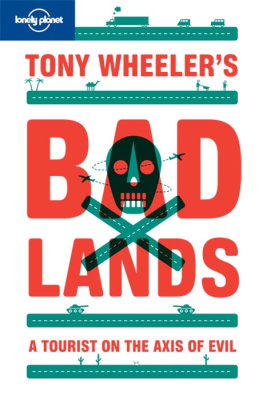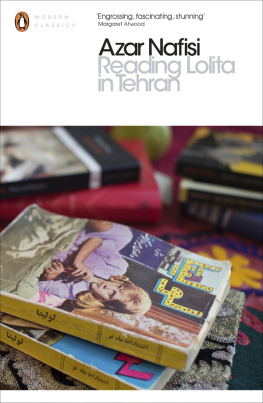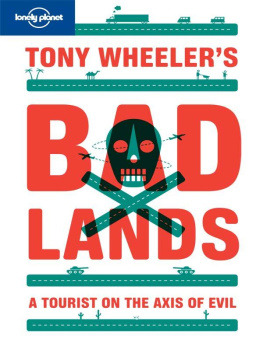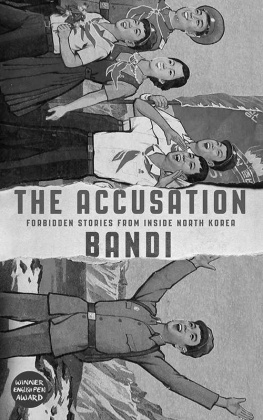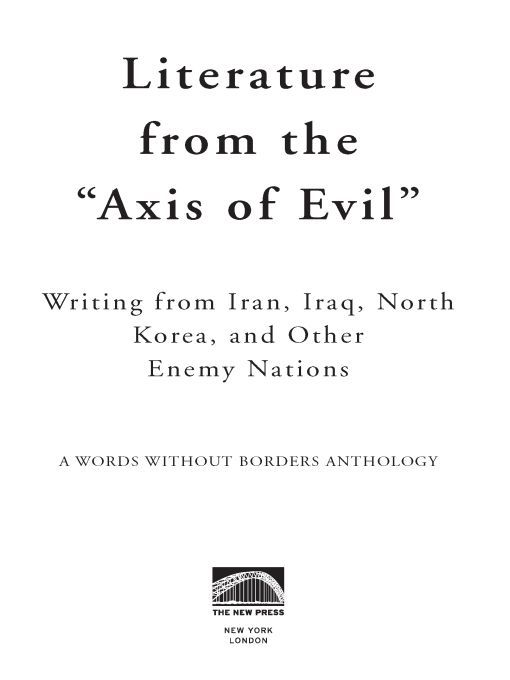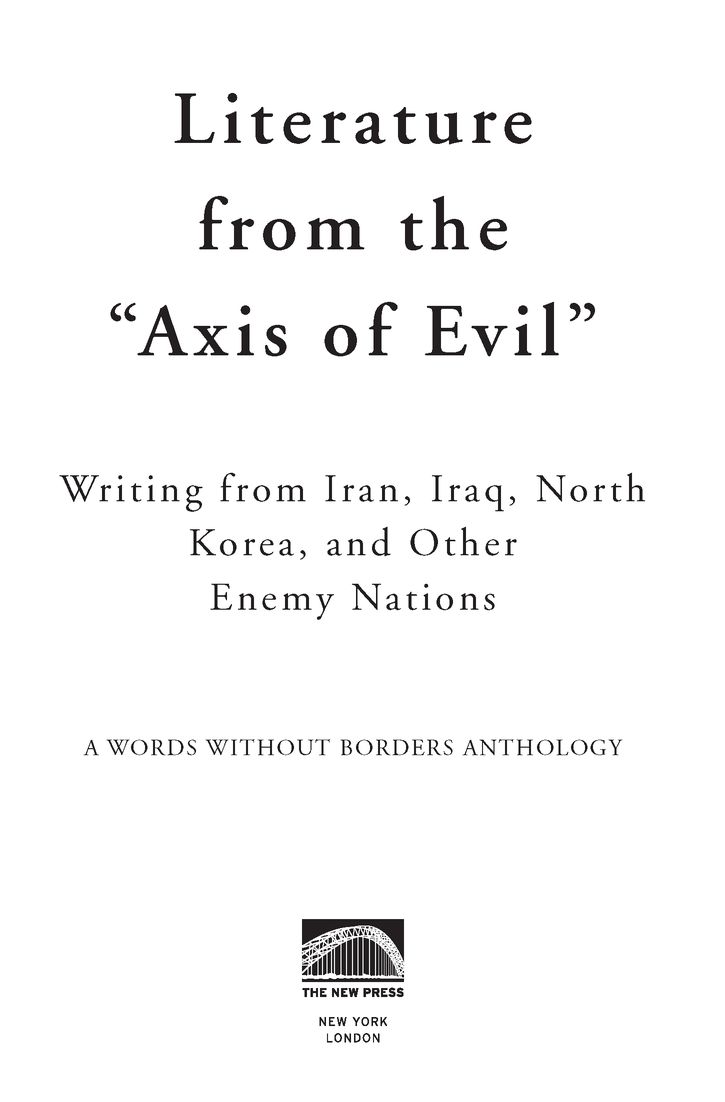Table of Contents
Acknowledgments
In compiling this anthology, we relied on the invaluable help of consulting editors and translators, some of whom have asked, for political reasons, not to be mentioned. The efforts of Ha-yun Jung, Zara Houshmand, Majid Roshangar, Tania Nasr, Khaled Mattawa, and Jacqueline Loss in finding these authors, selecting works, and arranging translations under tight deadlines were nothing less than a kind of literary heroism. Likewise, we are indebted to the exceptional generosity of agent Joy Harris in representing this project pro bono; the acuity and foresight of editor Diane Wachtell in envisioning an anthology framed by the concept of literature from the axis of evil (and keeping it to a reasonable length); the enthusiasm and diligence of assistant editor Joel Ariaratnam; and the beyond-the-call-of-duty dedication of production editor Sarah Fan, who coped with last-minute changes with extraordinary selflessness and grace. We also wish to gratefully acknowledge Bard College, our host institution from inception, and our funders (too numerous to mention here but identified on our Web site), especially the critical funding support of the Furthermore Foundation for this volume. Finally, we take this opportunity to remember the initial inspiration for and support of the founding of Words without Borders by the late Cliff Becker, literature director of the National Endowment for the Arts. Much loved and missed by the entire literary community, he was a friend to writers everywhere.
Editors Note
In economics, a trade deficit comes about when we import too many foreign goods. In culture and education (defying economics in so many ways!), we experience a deficit when we import too few. American culture has always been richer for its exposure to other cultures. Yet our trade deficit in literature has become extreme, and the last thing we should do in these dark times is shut ourselves off from seeking greater knowledge of foreign experience.
Since the 1970s, American access to world literature in translation has been steadily decreasing. A 2005 Bowker study calculated that only 3 percent of the books available for sale in the English-speaking world were works in translation. (A significant proportion of these, too, are new translations of known classics, rather than discoveries of unknown and contemporary writers in other languages.) By comparison, Western Europeans are accustomed to translated works making up about one-third of their smorgasbord of literary offerings. In 2003, then-PEN Translation Committee chair Esther Allen noted in a letter to the editor of Harpers that, according to a then-recent United Nations Development Program report, the Arab world, with a population of 280 million, translated only about 330 books per yeara figure directly comparable to that in the United States, where, with a population of 285 million and a vibrant publishing industry annually producing close to 200,000 books per year, we also published about 330 books in translation per year (excluding technical and scientific treatises). Official censorship and weak publishing infrastructure may be largely to blame in those notoriously closed societies in the Middle East, but what is our excuse in America? In summer 2003, the New York Times announced that America Yawns at Foreign Fiction, while pointing out that the number of books in translation that year accounted for fewer than 0.5 percent of the books available to Americans. The article seemed to accept at face value publishers contention that only the market is to blame, without acknowledging that successful markets are cultivated gardens, not wild states of nature.
To add insult to injury, in 2004, it came to the attention of the publishing community that the Treasury Departments Office of Foreign Assets Control (OFAC), which monitors transactions with nations under embargo, had for a number of years been requiring any publisher wishing to bring out a work by an author from a so-called enemy nation to apply for a license. In 2003, these nations included Iran, Iraq, North Korea (what George W. Bush memorably called the Axis of Evil), as well as Cuba and Syria. In recent history, Libya and Sudan have been on and off the OFAC list. Though the law was part of a larger set of economic sanctions against countries whose governments were in violation of international regimes, it seemed contradictory to say the least that a publisher in a country fiercely proud of its tradition of free speech should have to apply for a government license to translate, say, Iranian human rights activist and Nobel Peace Prize winner Shirin Ebadi. Ebadi clarified the absurdity of the problem when she wrote a
New York Times op-ed piece in 2004 arguing for a lifting of the prohibition so that she would be able to publish her memoirs in the United States, asking,
If even people like methose who advocate peace and dialogueare denied the right to publish their books in the United States with the assistance of Americans, then people will seriously question the view of the United States as a country that advocates democracy and freedom everywhere. What is the difference between the censorship in Iran and this censorship in the United States? Is it not better to encourage a dialogue between Iranians and the American public?
Soon after, the OFAC issued a blanket license that permits all publishing activity involving writers living in embargoed countries. Thus the OFAC has managed to preserve intact its power to grantor revokesuch a license. Writers who are government officials remain suspect, however, so if the Libyan writer Kamel al-Maghur included in this collection were still alive and active in the government, Words Without Borders could not have commissioned translation of his writing without the explicit permission of the U.S. Treasury Department.
This book was born in conscientious objection to the use of axis of evil rhetoric and to the OFACs apparent fear of free trade in ideas and literature, a fear that seemed to mirror that of bureaucracies in those regimes that appear on the OFACs list. Many of the writers in this volume were found living in exile from their home-lands, but many others could not have been translated without the OFACs explicit approval, prior to Ebadis intervention into the affair. Words without Borders, which gratefully receives grant funding from the National Endowment for the Arts to support its translations of foreign literature, is required to affirm that none of this funding or the necessary matching funds goes to authors living in any of these countries.
The Axis of Evil is an abstraction that obliterates both the very great differences between the included countries, which are not even remotely in alliance with each other, and the distinctiveness of the individuals who live in them. The devastation wrought by the axis of evil rhetoric and thinking behind it, from Abu Ghraib to the deaths and maiming of so many thousands of people, military and civilian, and the deaths and maiming yet to come from cancer and other illnesses related to depleted uranium from American smart weaponrythis is now glaringly clear. But it is not the place of this book to provide foreign policy analysis or commentary. Our hope was that with this book we might simply celebrate diverse works of literature and through them, provide fresh perspectives on the notion of the enemy nation. Is the enemy a particular leader, or a more pervasive ideology? A system of government, a people, a social group? Our intention has never been to present a naive apology for tyrannical regimes nor to recommend any particular political solution to the problems they present both internationally and for their own people, or to condone a commercial globalization dominated by the English language, orleast of allmilitary interventions by the United States.





